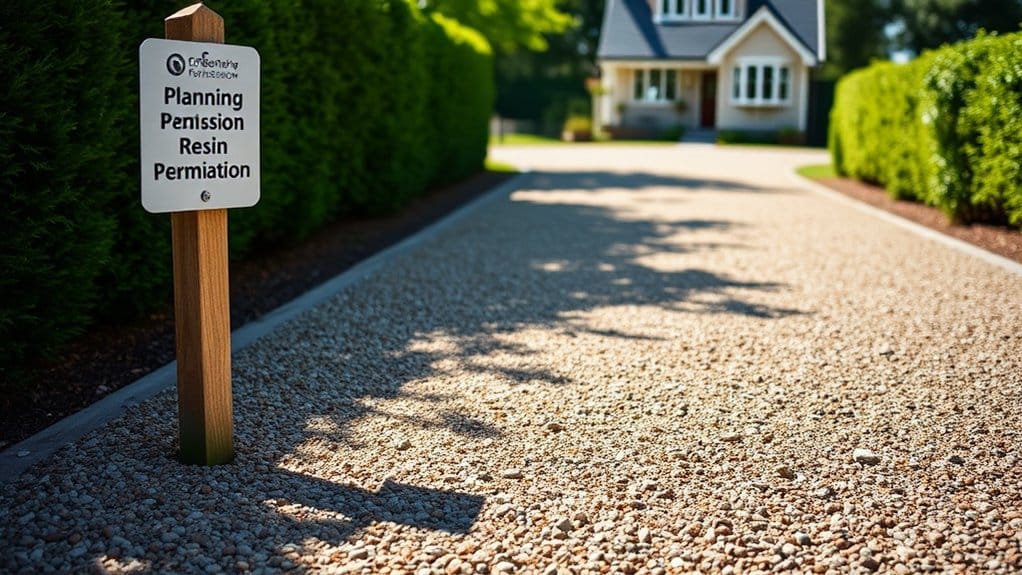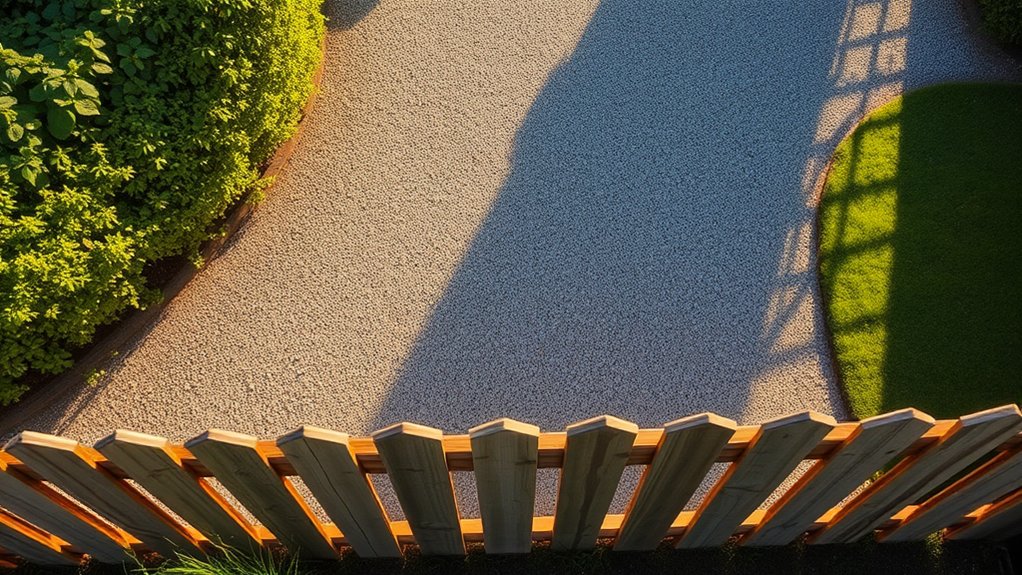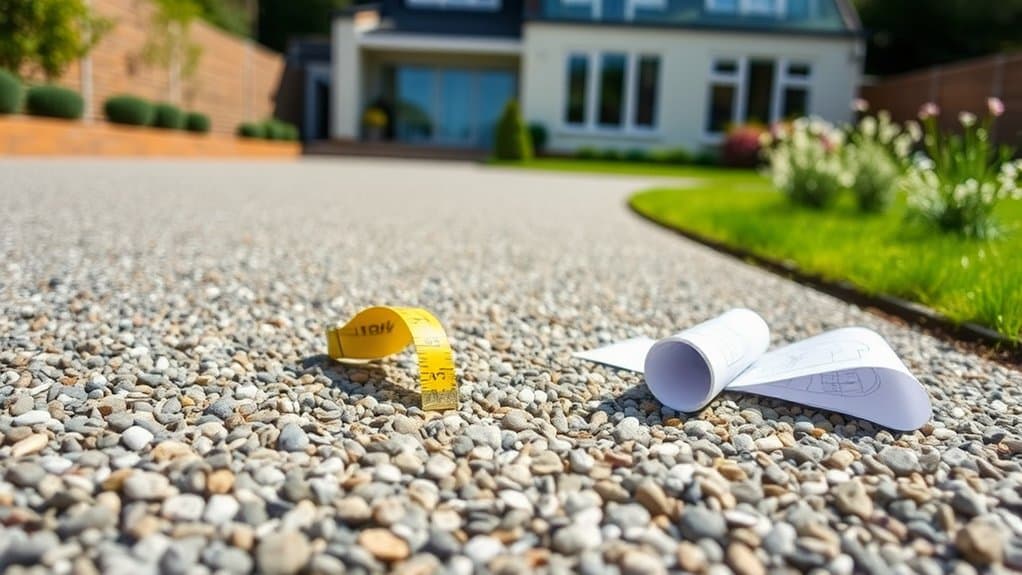Resin-bound gravel driveways don’t require planning permission in the UK, provided they meet proper drainage standards. The permeable nature of the surface lets rainwater soak through naturally, helping prevent localised flooding. You’re free to install areas under 5 square metres without permits, but larger installations might need council approval.
It’s worth checking with your local planning authority first, as requirements can vary by region. Some councils have specific rules about front garden surfaces, particularly in conservation areas or listed buildings.
Think of resin-bound gravel like a sponge – it soaks up rainfall rather than creating run-off like concrete or traditional paving would. This eco-friendly feature is precisely why planning permission isn’t typically needed.
Key Takeaways
Planning Permission for Resin-Bound Gravel: Quick Guide
Resin-bound gravel driveways and paths rarely need planning permission in the UK, as they’re naturally permeable – meaning rainwater drains through rather than running off into streets.
You’ll only need permission if:
- The surface is larger than 5 square metres and doesn’t allow water drainage
- You’re planning to add a new entrance to your property
- Your home is listed or in a conservation area
The key points:
- Standard domestic resin-bound installations are usually fine without permission
- The surface must meet proper drainage requirements
- Your local council may have specific rules, so it’s worth a quick check
- For peace of mind, ring your council’s planning department before starting
A chat with your local planning officer early on can save hassle later, especially for larger projects. Most councils offer free initial advice about whether you’ll need formal permission.
Understanding Resin-Bound vs. Resin-Bonded Gravel

Choosing between resin-bound and resin-bonded gravel comes down to several key factors.
Resin-bound surfaces offer a smooth, even finish – think of a well-laid garden path or smart driveway. These surfaces let water drain through naturally, which is brilliant for British weather and meets SUDS requirements. They’re also less likely to crack or allow weeds to sprout. Additionally, resin-bound driveways have a porous finish that enhances their drainage capabilities, making them a more cost-effective long-term investment for homeowners.
Resin-bonded surfaces have more grip, making them ideal for slopes or areas where extra traction is needed, such as car parks or steep garden paths. However, they don’t handle water drainage as well and often need extra drainage solutions fitted.
For maintenance, resin-bound is the easier option. It needs less upkeep and stays looking smart longer, whilst resin-bonded might need more attention to keep it looking top-notch.
Both types are durable, but your choice should match your specific needs. If you’re sorting out a family driveway that needs to look smart and handle heavy rain, resin-bound is your best bet.
For a sloping garden path where grip is crucial, resin-bonded might be the way to go.
Planning Permission Requirements for Driveways

Planning permission for driveways can be complex in the UK. You’ll typically need permission when creating a new driveway or significantly expanding an existing one.
Using permeable surfaces like resin-bound gravel often makes approval more likely, as these materials help prevent flooding and meet sustainability requirements. It’s important to note that permeable surfacing options, such as resin-bound gravel, do not require planning permission if they meet specific drainage conditions. Additionally, installing permeable materials can enhance water quality by filtering pollutants, benefiting the local ecosystem.
Key points to consider:
- Front garden conversions over 5 square metres require planning permission
- Dropped kerbs need council approval
- Any changes affecting road visibility must be approved
- Work affecting public pavements requires local authority consent
A practical example: If you’re turning your front garden into a driveway in London, you’ll need permission if using non-permeable materials like concrete.
However, using permeable gravel might exempt you from this requirement.
Contact your local council before starting any work – they’ll provide specific guidelines for your area and help you avoid costly mistakes.
Environmental Benefits of Resin-Bound Gravel

Environmental Benefits of Resin-Bound Gravel
Resin-bound gravel offers significant environmental advantages, chiefly through its excellent drainage properties. The permeable surface meets UK Sustainable Urban Drainage Systems (SUDS) requirements by allowing rainwater to filter through naturally, much like a garden lawn. This reduces local flooding risks and helps protect nearby streams and rivers from pollution. Additionally, its ability to mimic natural drainage patterns further enhances its role in promoting sustainable urban development.
| Benefit | Description | Impact |
|---|---|---|
| Permeability | Allows rainwater to drain effectively | Reduces flooding risks |
| Carbon Footprint | Lower due to efficient installation | Less environmental disruption |
| Resource Conservation | Incorporates recycled materials | Decreases waste and conserves natural resources |
The system particularly suits British weather conditions, combining practical environmental benefits with an attractive finish for driveways, paths and garden areas. Its use of recycled materials and straightforward installation process makes it a sensible choice for eco-conscious homeowners.
Size Limits and Exemptions

Resin-bound gravel offers planning permission advantages thanks to its permeable nature.
You don’t need planning approval for a resin-bound driveway, as it naturally drains rainwater into the ground or drainage systems. This differs from non-permeable surfaces like concrete, which require permission for areas larger than 5m². For concrete driveways exceeding this limit, you must obtain full planning approval.
To stay within regulations, ensure proper drainage management, particularly when adding to existing non-permeable surfaces. Local councils take these rules seriously to prevent flooding risks.
Think of it this way: whilst your neighbour might need council approval for their concrete driveway extension, your resin-bound project can proceed without the extra paperwork.
Steps to Apply for Planning Permission

Checking local planning rules is your first step before submitting any application. Start with your local council’s planning portal to confirm property details and requirements.
You’ll need accurate site plans and architectural drawings – these form the backbone of your application.
Get your paperwork sorted properly. Your plans must show precise measurements and details of the proposed work.
Most UK councils now accept online applications through the Planning Portal, where you’ll upload documents and pay fees. The planning office will check everything’s complete before moving forward.
Expect feedback from the planning officer – they might ask for changes or additional details.
Once you’ve addressed any concerns and received approval, you can apply for building regulations approval to start your project. Remember that listed buildings or conservation areas may need extra permissions.
Pro tip: Speaking with a planning officer early on can save time and help avoid common application pitfalls.
Frequently Asked Questions
Can I Install Resin-Bound Gravel Myself Without Permission?
A DIY resin-bound gravel installation typically falls under permitted development rights in the UK, meaning you won’t need formal permission. Still, it’s worth checking your local council’s specific rules, particularly if you live in a conservation area or listed building. For driveways, you’ll need to ensure proper drainage to comply with 2008 planning regulations – using permeable materials or directing water to a lawn or soakaway. Best to ring your local planning office if you’re unsure, as getting it wrong could mean costly corrections later.
How Long Does Resin-Bound Gravel Last Compared to Other Materials?
Resin-bound gravel surfaces typically last 15-25 years, offering better longevity than loose gravel or resin-bonded alternatives. With proper upkeep, including regular cleaning and prompt repairs, these driveways can serve well beyond 30 years – roughly the same lifespan as a quality block-paved drive. Think of it as a long-term investment, much like getting a new roof for your house.
Is Resin-Bound Gravel Suitable for All Climates?
Resin-bound gravel performs well across most UK climates. Its porous structure handles both heavy rainfall and frosty conditions, making it particularly suited to Britain’s changeable weather. The material drains effectively during wet spells and won’t crack during winter freezes – unlike traditional concrete or tarmac. However, for best results in extreme cold areas like Scotland’s Highlands, proper installation with the right aggregate mix is essential.
What Maintenance Is Required for Resin-Bound Gravel Driveways?
Regular maintenance of resin-bound driveways is straightforward and essential. A quick sweep with a stiff brush removes leaves and debris, whilst occasional washing with cold water keeps the surface pristine. For stubborn stains, a gentle pressure washer works well, though avoid excessive force that might damage the resin. During autumn, clear fallen leaves promptly to prevent staining. These simple steps ensure your driveway stays smart and serviceable for years to come.
Can Resin-Bound Gravel Be Installed Over Existing Surfaces?
Resin-bound gravel works brilliantly over existing surfaces like concrete or tarmac, saving both time and money on groundwork. Think of it as laying a new carpet over solid floorboards – the base must be stable and crack-free for proper bonding. Most driveways and paths in good nick are suitable, though you’ll want a professional to check the surface first to ensure it’s compatible. It’s a popular choice for UK homeowners looking to spruce up their outdoor spaces without starting from scratch.
Conclusion
Planning permission requirements for resin-bound gravel in the UK vary by location and circumstance. Generally, if you’re replacing an existing driveway with a permeable surface like resin-bound gravel, you likely won’t need permission. However, if you’re creating a new driveway or paving over a front garden, you’ll need to check local council regulations. Most councils consider resin-bound surfaces ‘permitted development’ as they allow natural drainage, but it’s worth checking your local authority’s specific rules. A quick call to your council’s planning department can clarify your situation and prevent costly mistakes down the line.
